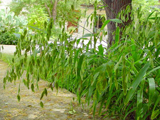Native Plants

Q. Who is Mr. Smarty Plants?
A: There are those who suspect Wildflower Center volunteers are the culpable and capable culprits. Yet, others think staff members play some, albeit small, role. You can torture us with your plant questions, but we will never reveal the Green Guru's secret identity.
Did you know you can access the Native Plant Information Network with your web-enabled smartphone?
Ask Mr. Smarty Plants is a free service provided by the staff and volunteers at the Lady Bird Johnson Wildflower Center.

rate this answer
Saturday - April 26, 2008
From: Pflugerville, TX
Region: Southwest
Topic: Erosion Control, Vines
Title: Virginia creeper in trees
Answered by: Nan Hampton
QUESTION:
Can Virginia creeper be allowed to climb on trees--specifically Texas ash and live oak--or will it damage them if allowed to attach itself? We are thinking of using it as erosion control in a greenbelt area but don't want the constant battle if it has to be pulled off the trees.ANSWER:
Parthenocissus quinquefolia (Virginia creeper) will climb on anything in its general vicinity, but it is not as pervasive or invasive as, say, Vitis mustangensis (mustang grape). Generally, it won't take over completely like the mustang grape, but it will climb the trees. Virginia creeper's potential for harm to the trees is that it might become so dense that it shades out the leaves of the tree and interferes with the tree's photosynthesis. So, all in all, it might be better to avoid putting Virginia creeper down as a ground cover, or at least be prepared to monitor it and keep it out of the trees.
All in all, grasses are the best solution to erosion control because of the dense fibrous roots that they produce. It sounds as if your area does have at least some shade so here are a few grasses that do well in partial shade that have attractive features. My guess is that you don't want something that is going to require a lot of mowing and these grasses are bunch grasses that are attractive both in their green growing stage and even after they have matured and "gone to seed". The old growth can be cut back once the new growth begins in the spring.
Schizachyrium scoparium (little bluestem)
Chasmanthium latifolium (Inland sea oats)
Sedges are another possible ground cover that don't require mowing and stay green all year long. Here are three possibilities:
Carex blanda (eastern woodland sedge)
Carex planostachys (cedar sedge)
Finally, here are a couple of low-growing herbaceous plants that do well as groundcovers alone or mixed in with the grasses and/or sedges.
From the Image Gallery
More Vines Questions
Non-blooming wisteria in Oklahoma
June 24, 2008 - I have a wisteria bush that doesn't bloom. It's two years old. What should I do?
view the full question and answer
Climbing vines that are deer resistant
July 12, 2013 - Please find plants that are climbing vines and are deer resistant
view the full question and answer
Carolina Jasmine failing to turn green in Pleasant Garden NC
April 26, 2011 - We planted Carolina Jasmine last year and it did great. This Spring we only have about 2-3 small green leaves beginning on the vines. We did not cut them back in the Fall. Is it time for them to be tu...
view the full question and answer
Vine for house in partial sun in Vermont
July 27, 2008 - we are looking for a climbing vine against the east side of our house, partial sun but need at least 20 feet tall, in zone 4, vermont
view the full question and answer
Passiflora and Leucophyllum together in Texas
April 23, 2015 - I've got a Passiflora incarnata that has self-propagated around a cenizo sage. My question is, will the passionflower vine choke out or otherwise damage the cenizo? Do I need to cut back the vine? ...
view the full question and answer
| Support the Wildflower Center by Donating Online or Becoming a Member today. |

